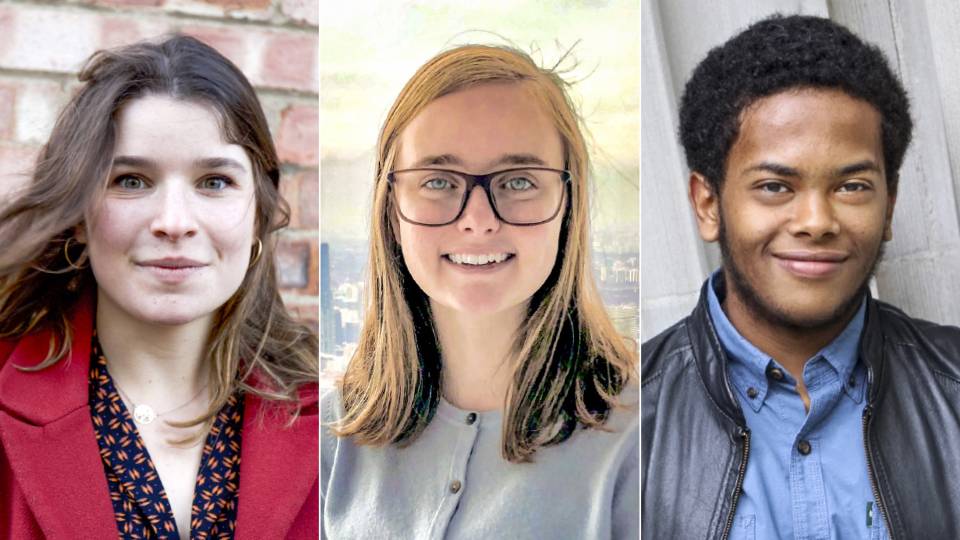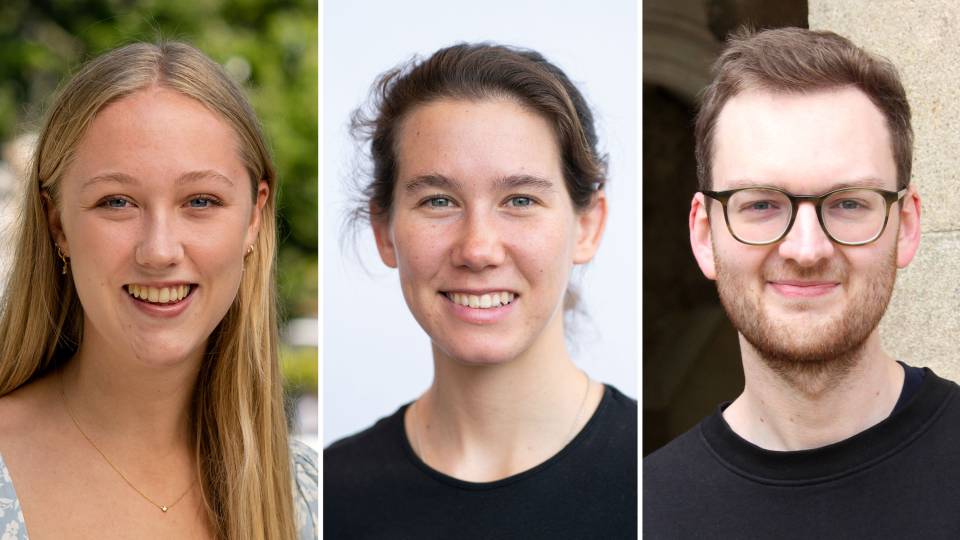Sachs Scholarship winners Noah James (left), Farzana Salik (middle) and Ethan Sample (right).
Princeton seniors Noah James and Ethan Sample and University of Oxford student Farzana Salik have been named recipients of the Daniel M. Sachs Class of 1960 Graduating Scholarship(Link is external), one of Princeton University’s highest awards.
James has been named as the Sachs Scholar at Worcester College at the University of Oxford, and Sample has been named as the Sachs Global Scholar. Salik will spend next academic year as a Sachs Visiting Scholar at Princeton.
The Sachs Scholarship is intended to broaden the global experience of its recipients by providing them with the opportunity to study, work or travel abroad after graduation. It was established by classmates and friends of Daniel Sachs, a distinguished Princeton student athlete in the Class of 1960 who attended Oxford as a Rhodes Scholar. Sachs died of cancer at age 28 in 1967. The award is given to those who best exemplify Sachs’ character, intelligence and commitment, and whose scholarship is most likely to benefit the public.
Noah James
James, of Amesbury, Massachusetts, plans to earn two master’s degrees while at Oxford, one in criminology and criminal justice and one in global governance and diplomacy. He also hopes to broaden his international scholarship by working with Oxford’s Transitional Justice Research network and Institute for Ethics, Law and Armed Conflict, as well as its Bonavero Institute of Human Rights.
“In a world increasingly shaped by globalization and mass migration, and where the paths toward justice for grave international crimes traverse political boundaries, I aim to develop expertise in border criminology and victim-centered atrocity accountability,” he wrote in his essay for the Sachs Scholarship.
At Princeton, he is majoring in the School of Public and International Affairs (SPIA) and minoring in Russian, East European and Eurasian Studies and history and the practice of diplomacy.
“More than anything, the scholarship is a reflection of the tremendous community that has supported me throughout my time at Princeton,” he said. “I’m so grateful to the professors who have become mentors and the friends who have become family for always looking out for me and making opportunities like this possible.”
SPIA lecturer Carol Martin met James through her SPIA task force, Improving Democracy and Governance in Developing Countries, for which he received the R.W. Van de Velde award for outstanding junior independent work.
“Noah continually astonishes me with the depth of his maturity in reflecting about the professional and personal resilience required for effecting meaningful, positive changes in global affairs,” she wrote in a letter of recommendation.
“With his extraordinary work ethic, his enthusiasm for problem-solving, and his sincere commitment to using his considerable talents to advance the well-being of others, he is one of the best young professionals I have ever encountered, as a scholar and as a development practitioner,” Martin added.
Last summer, James interned at the U.S. Department of State’s Bureau of Conflict and Stabilization Operations as part of SPIA’s 2024 cohort of the Scholars in the Nation’s Service Initiative, where he proposed transitional justice policies for the Haitian judicial system.
He has also interned at the U.N. Office of the Special Representative of the Secretary-General for Children and Armed Conflict and wrote a forthcoming report examining how juvenile justice frameworks can foster child soldier reintegration.
Barbara Buckinx, a SPIA research scholar and lecturer, supervised James during his U.N. internship. “Noah is an exceptionally talented and motivated individual with a strong background in human rights and international law research and one of the best students I have ever mentored or taught at Princeton,” she wrote in a letter of recommendation.
James also interned in SPIA’s Empirical Studies of Conflict program, where he analyzed U.S. political violence data for the Bridging Divides Initiative. He has been a research assistant twice at SPIA, once in a joint position with the Department of Economics. He is currently a fellow at SPIA’s Center for International Security Studies (CISS) and the Princeton European Union Program.
His senior thesis, advised by Sophie Meunier, a senior research scholar and lecturer at SPIA, focuses on the ongoing Lundin Oil trial in Sweden regarding alleged war crimes in Sudan.
He is also helping to organize the CISS annual conference, “Accountability at a Crossroads: International Law in a Time of Atrocities,” which invites academics, policymakers and lawyers to discuss the future of international justice.
Outside of his academic work, James has volunteered with the Princeton Asylum Project and the Pace Center for Civic Engagement’s Service Focus program. He previously served as the executive director of the Coffee Club, Princeton’s student-run coffee shop.
Ethan Sample
Sample, of Alexandria, Virginia, plans to use the Sachs Global Scholarship for a yearlong research project in the lab of Nobuyasu Koga, a professor at Osaka University’s Institute for Protein Research in Japan, where he hopes to use computational modeling to design new proteins for biotechnological applications.
“I am very grateful to my mentors, professors, family, friends and peers for their support. Without them, these pursuits would not be possible,” Sample said. “I am also thankful that the Sachs selection committee saw something in me, and for Princeton’s generous financial aid program, which enabled me to attend this institution.”
Sample is majoring in chemical and biological engineering. He began studying Japanese at Princeton and has pursued those studies for three years.
In his essay for the scholarship, he wrote that “the Sachs Global Scholarship would enable me to enter the rapidly growing field of computational protein design. This area of science bears promising applications for therapeutics and diagnostics that enhance public welfare.
“My proposal is the convergence of my love for the Japanese language and my lifelong goal of applying science to alleviate suffering,” he wrote.
After his year in Japan, Sample said he plans to return to the U.S. to enter a Ph.D. program in bioengineering or computational biology. He hopes to eventually become a protein scientist and help develop lifesaving therapeutic medicines.
Sample said his research experiences at Princeton were the inspiration for his interest in a career in science. He has conducted research in faculty labs within the departments of chemical and biological engineering, chemistry and molecular biology, including his studies on cell signaling in the lab of Jared Toettcher, an associate professor of molecular biology and bioengineering.
Jannette Carey, an associate professor of chemistry, said that after Sample completed her graduate course in biophysical chemistry as a first-year student, she asked him to collaborate on a textbook expanding on concepts from class. Sample’s name will be included on the cover of “Ligand-Binding Basics: Evaluating Intermolecular Affinity, Specificity, Stoichiometry, and Cooperativity,” which will be released in May — a rare distinction for an undergraduate student, “even at Princeton,” Carey added.
For his senior thesis, Sample is working in the lab of Jerelle Joseph, assistant professor of chemical and biological engineering and bioengineering, on computationally modeling RNA and protein interactions. He is focusing on a protein called TDP-43 and its ability to form biomolecular condensates, a phenomenon relevant to neurodegenerative diseases like amyotrophic lateral sclerosis (ALS) and frontotemporal dementia. He received the Department of Chemical and Biological Engineering’s Christodoulos A. Floudas Chemical Process Design Award his junior year.
Professor of Chemistry Michael Hecht, who taught Sample in a graduate course on proteins last year, said he was “particularly impressed by his insight on a range of complex and difficult topics.”
“I teach this course as a seminar where we discuss and critique papers from the scientific literature. In this interactive setting, Ethan was superb,” he wrote in his letter of recommendation. It was Hecht who introduced Sample to Professor Koga.
In addition to his academic achievements, Sample co-founded the student-run Princeton Biotechnology Group(Link is external) in 2022 and has served as a co-director.
Beyond campus, he has been a computational chemistry intern at D.E. Shaw Research in New York. He also interned with the Inova Advanced Lung Disease and Transplant Program at Inova Fairfax Medical Campus in Virginia, where he shadowed transplant pulmonologists who treated patients with cystic fibrosis.
Farzana Salik
Salik, of London, will spend next year as a visiting graduate student in Princeton’s School of Public and International Affairs (SPIA), where she plans to research the ethical use of artificial intelligence to address reproductive health inequities. She also hopes to earn SPIA graduate policy certificates in health and health policy, as well as science, technology and environmental policy.
Salik has a first class honors degree in law with starred distinction in equity law from Newnham College, University of Cambridge, and a distinction master’s degree in criminology and criminal justice from Worcester College, University of Oxford.
“I was incredibly humbled and overjoyed to receive the Sachs Scholarship. For a long time, I wasn’t sure that pursuing further education internationally would ever be within my reach. But the Sachs Scholarship has changed that,” she said.
Her project, titled “Addressing the Gender Data Gap in Healthcare through AI,” will investigate how AI can improve healthcare outcomes and shape future technologies.
“The rise of AI in healthcare holds immense potential. But without deliberate intervention, it threatens to deepen the very gender and racial disparities it aims to solve,” Salik wrote in her application essay. “Studying at Princeton, alongside leading experts in AI, public health, and policy, will allow me to refine my research and create impactful, sustainable interventions.”
“Farzana is a brilliant and dedicated young woman,” said Leila Ullrich, an associate professor of criminology at the University of Oxford, citing her “dedication to legal practice, advocacy and reform,” her keen analytical skills, and her commitment to justice.
Salik is currently a policy adviser in the U.K. Department for Science, Innovation and Technology, where she develops strategic policies on AI capability with industry leaders. After her studies at Princeton, she hopes to work toward more equitable healthcare systems in the U.K.
“It is indicative that at Princeton she proposes to work on a project concerning how ethically driven AI can address the gender gap in healthcare,” said Christina Angelopoulos, associate professor in intellectual property law at Cambridge, who served as Salik’s director of studies for three years. Angelopoulos underscored the rigor of Saliks’ undergraduate degree with first class honors and a starred distinction in equity law, “widely considered one of the hardest papers on the course.”
Salik’s academic awards include Newnham’s Betty Wu Lee Prize and Oxford’s Kalisher-Oxford Criminology Scholarship, among many others. Salik has experience working at law firms, NGOs and within the U.K. court system.






